- Home
- Catherine Jinks
Pagan's Scribe Page 19
Pagan's Scribe Read online
Page 19
A noise. The door. It’s Father Pagan.
He slouches into the room, dragging his feet, his dark face even darker than usual. ‘Isidore,’ he says dully. ‘What’s wrong? Have you had a fit?’
‘Father. Did they –’
‘He’s all right,’ Lord Roland interrupts. ‘He’s just a little nervous.’
By the blood of the Lamb! Look at the way he’s moving! Look at the way he casts himself onto his bed! ‘Father, what happened? Is the King back? What did he say?’
‘He said goodbye.’ The Archdeacon doesn’t move: he just lies there, staring at the ceiling. ‘Goodbye and good luck.’
‘But –’
‘Didn’t I say it was hopeless? Didn’t I say they were mad dogs?’
‘What were the terms?’ Lord Roland speaks clearly and quietly. ‘Unconditional surrender?’
‘Almost. They said the Viscount could leave, with eleven of his men. The rest of us would have to take what comes.’
Oh God.
‘Even the King saw it was hopeless.’ The Archdeacon utters a sour little laugh. ‘When they told him the terms, he said ‘That will happen when an ass flies in the sky’, and turned on his heel. I would have farted in their faces.’
A long, long pause. I don’t believe it. This can’t be true.
‘Then we fight on?’ Lord Roland says at last.
‘On and on and on.’ The Archdeacon rolls over, and buries his face in his blanket. ‘Jesus, Roland, I’m so tired. I’m so tired.’
‘Then you should sleep more. We should all sleep more.’
‘My head hurts.’
‘I’ll give you something.’
This is crazy. They’re both so calm. Don’t they understand? We’re going to be killed! We’re going to stay in here until we’re half dead of thirst, and then the crusaders will come and – and –
‘Isidore?’ Lord Roland. ‘It’s all right, Isidore.’
All right? All right?
‘You mustn’t worry.’ He leans down, his hand still on my head. ‘We won’t let anything happen to you.’
‘No, you won’t! Because you’ll both be dead and buried!’
‘Oh, don’t be a fool, Isidore.’ The Archdeacon sounds cross. He sits up, and rubs his face. ‘Come over here.’ (Patting the bed beside him.) ‘I’m going to explain something.’
You mean you’re going to lie about something. I’ve got eyes, Father Pagan. I’ve got ears. I know what’s going on.
‘Listen.’ He puts an arm around my shoulders. It feels frail and insubstantial – not like Lord Roland’s hand. His fingers are very small and brown and thin. ‘You’re obviously letting that imagination of yours run away with you,’ he says. ‘And you’re doing that because you’ve had no experience of war. Now I’m going to tell you what I believe is going to happen, and I’m not trying to make you feel better, I’m telling you this because it’s really what I think. And I know what I’m talking about because I’ve had a lot of experience. All right?’
There’s a scar on his face. I’ve never noticed it before. It’s not big and jagged, like the one on his forehead; it’s small and neat, and it’s sitting back near his left ear.
‘Isidore! I’m talking to you!’
‘Yes, Father.’
‘Are you listening?’
‘Yes, Father.’
‘All right.’ He takes a deep breath. ‘Now what you saw today was not the end of the world. It was simply a bluff. Think of what happens when you go to the market: when the man selling shoes offers you a price, do you pay him that price? Of course not! And he doesn’t expect you to pay it, either. At least, he’s hoping you might, but he’s quite happy to come down. Well, it’s the same with a parley. These terms are simply the first set of terms, to test us out. They want to see if we’d be mad enough to accept them.’
Is that true? Is that really true? It sounds like the truth, but then Father Pagan makes everything sound like the truth. What was it he said to the Viscount? ‘The truth or falsity of an argument makes no difference, if only it has the appearance of truth.’ Father Pagan is trained to persuade.
‘If that’s so, Father . . .’
‘It is so.’
‘Then why has the King left? Why hasn’t he stayed to negotiate the next set of terms?’
His eyes are screwed up into such a squint that I can’t see into them. I can’t tell from his expression whether he’s lying or not. But his smile is real: it flashes through his beard like the sun emerging from behind a cloud.
‘Don’t you believe me, Isidore?’
‘I don’t know.’
‘Perhaps you’d believe what I’m telling you if you read it in a book.’
‘Don’t laugh at me!’
‘I’m not laughing.’ His teeth disappear back into his beard, but the smile remains in his voice. ‘The fact is, no king is going to sit around in this stinking place for the next three weeks. Not if he doesn’t have to. I certainly wouldn’t, if I were the King of Aragon.’
‘Then you think he’s going to come back?’
‘Who knows? He might. But kings are notoriously busy people.’
I suppose so. I suppose that’s true.
‘Isidore.’ The Archdeacon still sounds amused. ‘Don’t you think, if we were in mortal danger, that I’d be a bit frightened myself? Hmm? Don’t you think I’d be running around in a panic?’
‘No.’
‘No?’ He seems genuinely surprised. ‘Why not?’
‘Because you’re brave. You’re always brave. You’re the bravest man I’ve ever known.’ (Wait. That’s not right.) ‘Except for Lord Jordan. He’s brave, too. (Not that it means much, for someone like me to say it.) ‘Of course, I haven’t met many people.’
A crack of laughter, right in my ear. ‘God, Isidore, what a find you are.’ He squeezes me with his arm, as if I were a friend. As if I were Lord Roland. ‘You’re the one who’s brave,’ he says. ‘You’re the one who chose to come. You could have stayed in Montpellier.’ Another sympathetic laugh. ‘Perhaps you would have stayed, if you’d known what it was going to be like.’
‘Perhaps.’ I don’t know. I don’t think so. Even now I don’t think so. ‘But what would I have done, if I’d stayed?’
‘Read books?’
Read books? How could I have read books? My eyes would have been turned to Carcassonne, from morning till night. ‘Maybe there wouldn’t have been any books. Maybe things would have been worse there. “For who knoweth what is good for man in this life, all the days of his vain life which he spendeth as a shadow?” ’
‘Fair enough.’ The Archdeacon slaps me on the back, and rises. ‘I can tell you one thing that’s good for man, though, and that’s his supper. I’m starving. Are you starving?’ He laughs again, through his nose. ‘Or perhaps that’s an unfortunate choice of words, in the circumstances.’
You see? He’s so brave.
Who else would laugh in the face of famine?
Chapter 27
19 August 1209
Look at that cockroach scurrying across the floor. It seems so full of energy. Do cockroaches drink, or do they just eat? But there’s not much left to eat, either. I wouldn’t have expected to see cockroaches thriving, in a town where the people are hoarding every crumb.
It’s not fair. Why can’t I rush about like that cockroach?
‘Isidore.’ Lord Roland is standing on the threshold. ‘Are you awake?’
‘Yes.’
‘How do you feel?’
Grunt. How do you think I feel? My own clothes abhor me.
‘Are you feeling any better?’
‘No.’
He crosses the room on noiseless feet, and opens up the shutters. ‘Let me look at you,’ he says. ‘Can you sit up?’
I suppose so. If you insist. The cockroach has disappeared, and so has everyone else. Where are they all?
‘Where’s Father Pagan?’
‘He’s at the castle.’
‘Where’s Lord
Jordan?’
‘He’s at the castle, too.’
‘Why? Has something happened?’
‘I’m not sure.’ Lord Roland presses his hand to my forehead. ‘You’re still very hot.’
Of course I’m hot! Everyone’s hot! ‘I think I can get up now.’
‘Do you?’
‘I think I’ll go to the castle.’
But he shakes his head. ‘Pagan told me to take you for a walk along the battlements,’ he says quietly.
Pardon?
‘He thinks you need some fresh air.’ A sigh. ‘I have to agree with him. The air in this city is very unhealthy. It’s full of poisonous vapours.’
‘But what’s happening at the castle?’
‘Nothing that need worry you.’
‘But –’
‘Isidore.’ He’s feeling for my pulse. ‘If it was bad news, do you think Pagan would let us go up on the battlements?’
That’s true. He wouldn’t. ‘Then it’s good news!’
‘Perhaps.’
‘Then tell me! Please tell me!’
‘Not if you’re going to get excited.’
‘I’m not. I won’t. It will calm me down.’
‘Oh will it?’
‘Yes it will. Because otherwise I’ll just keep wondering and wondering.’
He smiles. ‘Sometimes you sound so much like Pagan,’ he says. ‘If I tell you, will you promise to come up to the battlements?’
‘Yes, of course.’
‘Let’s go, then.’
What? But –
‘I’ll tell you when we get up there.’
Oh, very clever. Highly amusing. He hands me my boots, and heads for the door. Wait! Don’t rush! I don’t have the strength to rush.
These boots smell like rotten fish.
‘Wait! Hold on –’
‘I’m waiting.’
There. Done. He’s holding open the door. ‘You can lean on me, if you want,’ he says.
‘It’s all right.’
‘Where’s Centule?’
‘I don’t know.’ The kitchen’s deserted. ‘Fetching water?’
‘As long as he’s locked all the food up . . .’
It’s sunny outside. It’s always sunny outside. If only it would rain! There’s a baby crying somewhere – crying and crying and crying – and somebody’s sharpening a knife on a whetstone. Smoke rises from the refugees’ shanties huddled in the shadow of the city wall. A dead body has been left on the road, wrapped in a blanket; I can smell it from here.
‘We’ll go via the tower of Saint-Nazaire,’ Lord Roland remarks. ‘The guards there know me now.’
‘Father?’
‘Yes?’
‘Do I really sound like Father Pagan?’
‘Sometimes.’ His eyes are screwed up against the afternoon glare. ‘You sound like him when he was your age.’
‘What was he like, when he was my age?’
‘Oh . . .’ A pause. ‘Not much different from the way he is now. A little quieter, perhaps. Less confident.’ He smiles, as if at some distant memory. ‘Cheekier.’
‘Do you think he’s a great man?’
‘A great man?’ Lord Roland seems to ponder, as he strides along with his hands in his sleeves and his gaze on the battlements. ‘Yes,’ he says at last. ‘Yes, I do.’ He looks down his long nose at me. ‘Do you?’
‘Oh yes.’ How can I explain? Of course he’s not a devout person. He’s not a saint or anything, he’s just . . . ‘He’s the most learned man I’ve ever met, but it’s not just books. It’s life, as well.’ (He has such depth of knowledge.) ‘I wouldn’t say he was a model priest, though. I wouldn’t say that.’
‘No.’ Lord Roland smiles again. ‘No, I don’t think anyone could say that.’
And here’s the tower. Its entrance is a little hole punched high in the wall, reached by a ladder and guarded by a man whose face is like the seven plagues of Egypt. ‘Can you manage that ladder?’ Lord Roland enquires.
‘I think so.’
‘Wait here.’ He begins to climb, rather stiffly, and the man at the top of the ladder watches without a change of expression. They begin to talk before Lord Roland has even reached him, but it’s hard to hear what they’re saying. At last Lord Roland turns, and beckons.
‘Come on!’ he says.
And up we go: one step, two steps, three steps. The rungs are worn smooth, polished by the passing of so many feet. They’re slippery and dangerous. Take it slowly, Isidore. (My knees are beginning to tremble.) The soldier spits, and it sails past my left ear.
‘Stop that!’ Lord Roland’s stern voice. He leans down, extending a hand. ‘Grab hold of me,’ he says. ‘That’s right. There.’
Done it. Hooray! This room is so dark that I can barely see him: he takes my elbow and guides me towards the stairs, circular stairs leading up to the parapet. Their treads are slippery, too – greasy with lamp-oil. ‘Be careful,’ he mutters. ‘Watch your step.’ Why don’t they clean up around here? The light’s growing stronger and . . . yes! At long last.
What a wonderful breeze. So fresh and pure.
‘Breathe it in,’ Lord Roland instructs. ‘It will clear your head.’ He sets off along the parapet, heading east: soldiers on guard duty stare at us both, some grinning, some scowling, some blank-faced, like cows. They look small and mean and dirty against the soaring, glowing background of spreading fields and blazing skies.
And there are the crusaders. So many of them! A great ring of tents and fires, horses, mules, carts, flags, garbage. Just like a town with no houses. All the vineyards are gone, pulled up for fuel. Every blade of grass has been trodden into the dirt.
‘Father?’
‘What?’
‘Aren’t you going to tell me what’s happening? At the castle?’
‘Oh.’ He stops, and looks around. ‘Of course. Forgive me. It was a message from the Count of Nevers.’
‘Who?’
‘One of the crusading lords. He wants to speak to the Viscount.’
‘Why?’
‘To discuss terms, I presume.’
‘To parley?’
‘Yes.’
‘To parley! That’s good news, isn’t it?’
‘Perhaps.’
He’s engulfed by the shadow of another tower, and passes straight through it to the next stretch of parapet. More sun, more soldiers. He’s taller than most of them, and broader in the shoulders: he keeps glancing at the crusaders’ camp, as if it’s troubling him.
‘Father?’
‘Mmm?’
‘Is that what’s happening now? Is the Viscount parleying with the Count of Nevers?’
‘No.’ He shades his eyes with his hand, as he peers out over the battlements. ‘The Count wants Lord Raymond to go to him. Lord Raymond doesn’t know if that’s wise. I believe he’s seeking advice from his counsellors.’
‘Father Pagan, you mean?’
‘He’s one of them.’
‘And your brother?’
A grunt. I shouldn’t have said that: he doesn’t like talking about Lord Jordan. He’s swallowed up by another tower – disappearing into the darkness – and there’s an angry exclamation. What? What’s happening? I can’t see . . .
‘Are you trying to break our necks?’ he barks, as someone scrambles around on the floor. Who is it? Did Lord Roland fall over him? A hand on my arm, and suddenly we’re in the light again: the light and the breeze. Lord Roland is muttering to himself. ‘Asleep on duty . . . bad sign . . . foolishness . . .’ But all at once he falls silent. He slows. He stares.
‘What is it, Father?’
No reply. It’s those crusaders; they’re still bothering him, for some reason. His face is set like a rock. Glancing along the wall, he releases my arm. ‘Stay here,’ he says. Up near the next tower there’s a big man with a sword: when Lord Roland approaches him, and speaks to him, he frowns and shrugs and begins to argue. Lots of pointing and waving. What on earth is going on?
‘There!’ Someone yells from behind me – a bare-chested man whose subsequent words are lost on the wind. Flurries of movement, up and down the walls. Lord Roland is running. What . . .?
‘Run!’ he cries. ‘Run, Isidore, run!’
Run? Where? Why? What are you –
Wh-oo-oo-oom-CRASH!
‘Down! Get down!’ His weight – falling – help! Flat on my belly, and he’s on my back. He’s shielding my head with his arms.
Wh-oo-oo-oom-CRASH! The foundations shudder.
‘What is it? What is it?’
‘Mangonels.’
‘What?’
‘Siege machines! Keep your head down!’
Oh God. Oh God, have mercy upon us. ‘But you said they wanted to parley!’
‘It’s insane –’
‘Oh God. Oh God.’
People running past. People shouting. Lord Roland’s breath on my tonsure. ‘We’ve got to move,’ he gasps. ‘They’re clearing a space for the ladders.’
‘O-God-thou-art-my-God-early-will-I-seek-thee –’
Wh-oo-oo-oom-CRASH! Something patters down like hail. Clouds of dust – I can’t breathe – a chorus of shouts from somewhere in the distance. Somewhere . . . below?
‘Crawl! Crawl!’ Lord Roland, pushing me from behind. I can’t! I can’t crawl! Leave me alone! Ouch!
‘Don’t hit me!’
‘Then move! Crawl! They’re coming!’
‘Oh my God. Oh my God.’
‘To the tower! We’ve got to get to the tower!’
The tower. It’s just ahead. We’ve got to get to the tower. My heart: my heart’s so loud I thought it was drums.
Wh-oo-oo-oom . . . (he pushes my head down) . . . CRASH!
Screaming. Someone screaming. Christ on high.
‘Don’t stop!’ Lord Roland, shouting in my ear. ‘Keep moving!’
But the man’s there. He’s right there, lying with his arms spread, and his head all . . . still pumping . . . sprays of . . .
I’m going to be sick.
‘Don’t look!’ Lord Roland’s voice. What’s he doing? He reaches out and grabs the sword – the discarded sword. It’s spattered with blood. Chunks of rock everywhere, splintered rock, and a hole in the defences where they’ve knocked down a merlon. How are we going to get past that? Something whizzing overhead, clinking on rock . . .

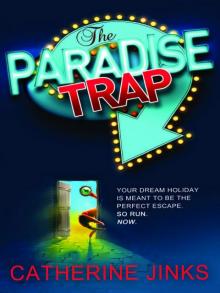 The Paradise Trap
The Paradise Trap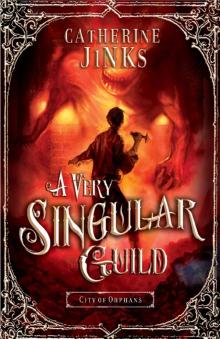 A Very Singular Guild
A Very Singular Guild Eloise
Eloise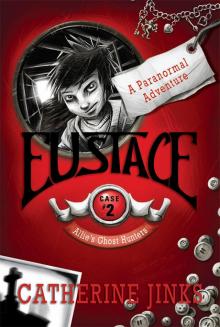 Eustace
Eustace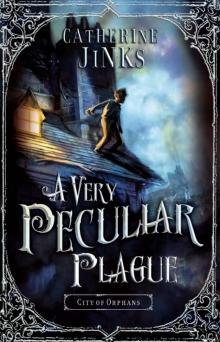 A Very Peculiar Plague
A Very Peculiar Plague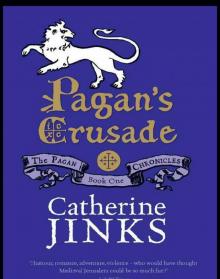 Pagan's Crusade
Pagan's Crusade The Gentleman's Garden
The Gentleman's Garden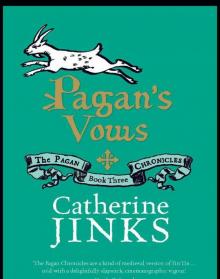 Pagan's Vows
Pagan's Vows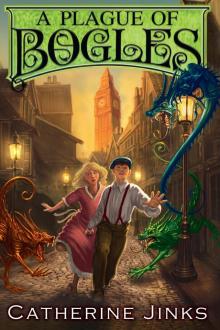 A Plague of Bogles
A Plague of Bogles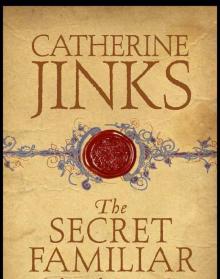 The Secret Familiar
The Secret Familiar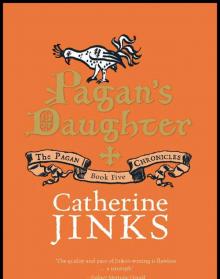 Pagan's Daughter
Pagan's Daughter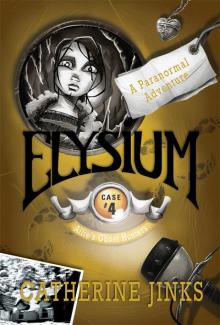 Elysium
Elysium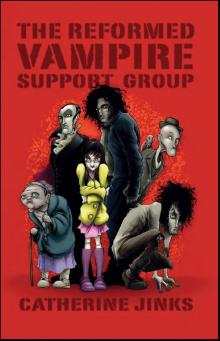 The Reformed Vampire Support Group
The Reformed Vampire Support Group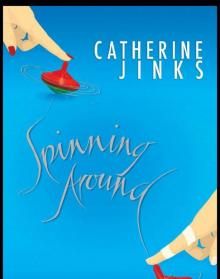 Spinning Around
Spinning Around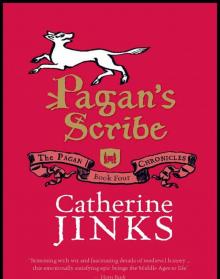 Pagan's Scribe
Pagan's Scribe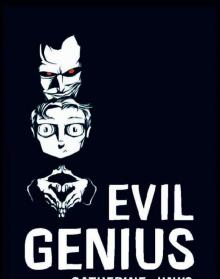 Evil Genius
Evil Genius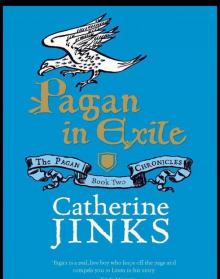 Pagan in Exile
Pagan in Exile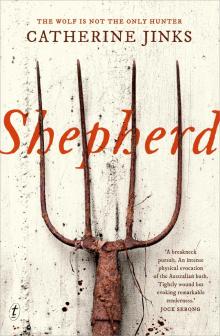 Shepherd
Shepherd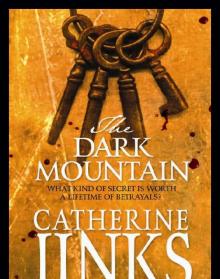 The Dark Mountain
The Dark Mountain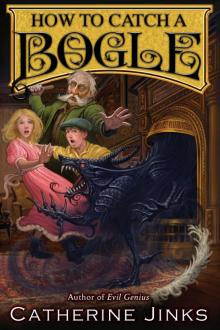 How to Catch a Bogle
How to Catch a Bogle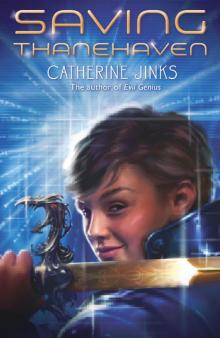 Saving Thanehaven
Saving Thanehaven The Genius Wars
The Genius Wars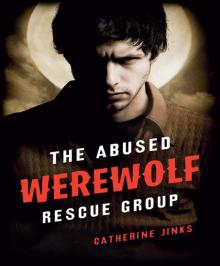 The Abused Werewolf Rescue Group
The Abused Werewolf Rescue Group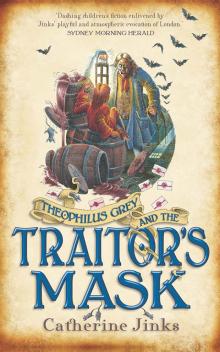 Theophilus Grey and the Traitor's Mask
Theophilus Grey and the Traitor's Mask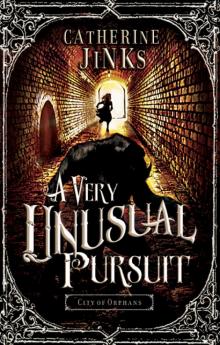 A Very Unusual Pursuit
A Very Unusual Pursuit Genius Squad
Genius Squad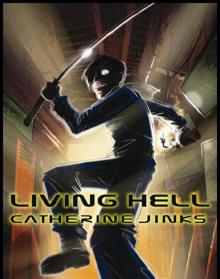 Living Hell
Living Hell The Road
The Road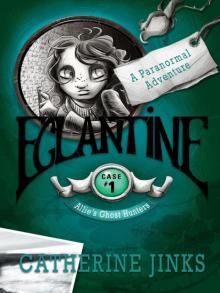 Eglantine
Eglantine